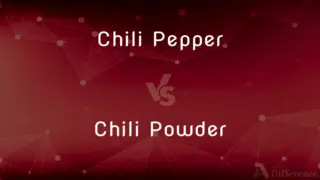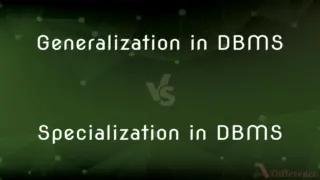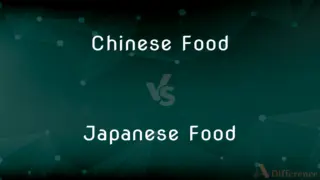Ingestion vs. Egestion — What's the Difference?
By Tayyaba Rehman — Published on January 17, 2024
Ingestion is the process of taking in food or substances through the mouth, while Egestion is the elimination of undigested waste from the body.

Difference Between Ingestion and Egestion
Table of Contents
ADVERTISEMENT
Key Differences
Ingestion involves consuming food or drink, beginning the process of digestion. Egestion, on the other hand, is the final step in digestion, expelling undigested waste.
The primary function of ingestion is to introduce nutrients and energy sources into the body. Egestion serves to remove indigestible substances, maintaining the body's health.
Ingestion is a voluntary action involving the conscious consumption of food and liquids. In contrast, egestion is typically an involuntary process, controlled by the body's digestive system.
While ingestion occurs through the mouth, involving chewing and swallowing, egestion happens at the end of the digestive tract, specifically through the anus.
Ingestion is the first step in the digestive process, essential for sustenance and growth. Egestion, although the last step, is crucial for eliminating waste and preventing toxin buildup.
ADVERTISEMENT
Comparison Chart
Definition
Taking in food or substances through the mouth
Eliminating undigested waste from the body
Primary Function
Introduce nutrients and energy into the body
Remove indigestible substances
Voluntary/Involuntary
Voluntary process
Involuntary process
Occurrence
Occurs through the mouth
Occurs at the end of the digestive tract
Role in Digestion
First step in digestion
Last step in digestion
Compare with Definitions
Ingestion
The act of consuming food or drink.
Ingestion of healthy foods contributes to overall wellness.
Egestion
The process of excreting undigested food from the body.
Egestion is a natural part of the digestive cycle.
Ingestion
The first step in the process of digestion.
The ingestion of food begins the digestive process.
Egestion
The final stage of the digestive process.
Egestion concludes the body's processing of consumed food.
Ingestion
The absorption of chemical substances into the body.
Ingestion of certain medications is necessary for treatment.
Egestion
The act of expelling solid waste from the intestines.
Healthy egestion patterns indicate good digestive function.
Ingestion
Eating or drinking as a means of nourishment.
Proper ingestion habits are key to a balanced diet.
Egestion
Discharging indigestible substances from the body.
Egestion ensures removal of toxins from the system.
Ingestion
Taking substances into the body through the mouth.
Ingestion of water is essential for hydration.
Egestion
Elimination of waste matter from the digestive tract.
Regular egestion is important for digestive health.
Ingestion
To take into the body by the mouth for digestion or absorption.
Egestion
To discharge or excrete from the body.
Ingestion
To take in and absorb as food
"Marine ciliates ... can be observed ... ingesting other single-celled creatures and harvesting their chloroplasts" (Carol Kaesuk Yoon).
Egestion
The act or result of egesting
Ingestion
The action of ingesting, or consuming something orally, whether it be food, drink, medicine, or other substance. It is usually referred to as the first step of digestion.
Egestion
Act or process of egesting; a voiding.
Ingestion
(by extension) The act of ingesting something into a jet engine.
Ingestion
The act of taking or putting into the stomach; as, the ingestion of milk or other food.
Ingestion
The process of taking food into the body through the mouth (as by eating)
Common Curiosities
Is ingestion a voluntary action?
Yes, ingestion is a conscious and voluntary action.
Can ingestion include liquids?
Yes, ingestion includes both solid food and liquids.
Is egestion the same as excretion?
No, egestion specifically refers to removing solid waste, while excretion includes all waste removal.
How does ingestion start digestion?
Ingestion begins digestion by introducing food into the digestive system.
What is ingestion in simple terms?
Ingestion is the act of eating or drinking substances.
Can egestion indicate health problems?
Changes in egestion patterns can signal digestive or health problems.
Are there disorders related to ingestion?
Yes, conditions like eating disorders affect ingestion.
What affects egestion frequency?
Diet, health, and hydration can impact egestion frequency.
Why is ingestion important?
Ingestion is crucial for obtaining nutrients and energy.
What exactly is egestion?
Egestion is the process of eliminating undigested waste from the body.
Is ingestion a part of metabolism?
Ingestion is the initial stage of the metabolic process.
Does egestion occur daily?
Yes, egestion typically occurs daily as part of normal digestion.
Can egestion be controlled?
Egestion is largely involuntary, controlled by the digestive system.
How does poor ingestion affect health?
Poor ingestion habits can lead to nutritional deficiencies and health issues.
Do medications affect egestion?
Certain medications can impact egestion processes and patterns.
Share Your Discovery

Previous Comparison
Chili Pepper vs. Chili Powder
Next Comparison
Generalization in DBMS vs. Specialization in DBMSAuthor Spotlight
Written by
Tayyaba RehmanTayyaba Rehman is a distinguished writer, currently serving as a primary contributor to askdifference.com. As a researcher in semantics and etymology, Tayyaba's passion for the complexity of languages and their distinctions has found a perfect home on the platform. Tayyaba delves into the intricacies of language, distinguishing between commonly confused words and phrases, thereby providing clarity for readers worldwide.
















































